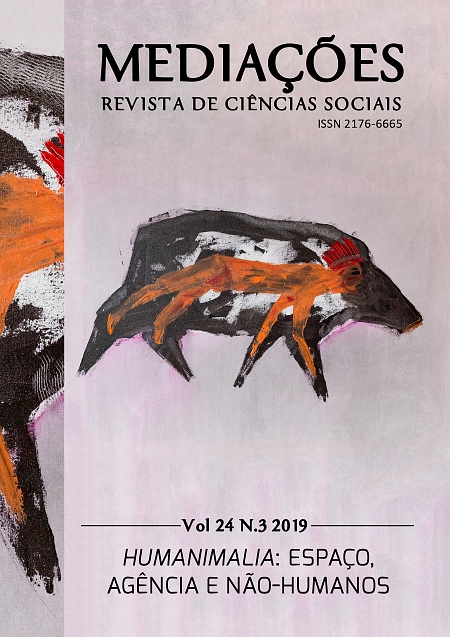Afetos políticos antipredicativos e linguagem no pós-revolução do Egito urbano
DOI:
https://doi.org/10.5433/2176-6665.2019v24n3p114Palavras-chave:
Manifestações urbanas, Reuniões concentradas, Work in progress, Pós-revolução, EgitoResumo
O texto procura produzir algumas considerações analíticas sobre duas formas de mobilização popular que se estendem pelo período conhecido como ba?d al-tha?ra (o pós-Revolução Egípcia de 25 de Janeiro de 2011): al-f?s (os debates) e os brutust?t al-?ay (os protestos de bairro). A potencialidade política dessas modalidades de manifestações é flagrada no caráter aqui chamado de work in progress de suas experiências: suas capacidades de mobilização baseadas no processo de execução de atos comunicacionais passageiros e na espontaneidade com que os seus coletivos de participantes são agregados. Ao descrever esses eventos populares realizados na forma de reuniões concentradas, abre-se a uma reflexão sobre os estranhamentos constitutivos que eles inspiram entre os habitantes das periferias cairotas, bem como sobre as identificações antipredicativas de ordem linguística, afetiva e, principalmente, política que capacitam. Os resultados ora comunicados decorreram de incursão etnográfica realizada entre 2014 e 2015 pela cidade do Cairo e por vilas do Baixo Egito, quando o assunto das juventudes e das suas formas expressivas de comunicar o tempo do pós-Revolução ocupavam o centro do interesse de pesquisa.Downloads
Referências
ABU-RISH, Z. Protests, regime stability, and State formation in Jordan. In: KAMRAVA, M. Beyond the Arab Spring: the evolving ruling bargain in the Middle East. Oxford-New York: Oxford University Press, 2014. p. 227-312.
ALEXANDER, A.; BASSIOUNY, M. Bread, freedom, social justice: workers and the Egyptian Revolution. London: Zed Books, 2014.
AL-SAYYAD, N. Cairo: history of a city. Cambridge-Massachusetts-London: The Belknap Press of Harvard University Press, 2011.
AMIN, G. Egypt in the era of Hosni Mubarak (1981-2011). Cairo-New York: American University in Cairo Press, 2012.
AMIN, S. Event, metaphor, memory: Chauri Chaura (1922-1992). Berkeley: University of California Press, 1995.
ARENDT, H. Sobre a revolução. São Paulo: Companhia das Letras, 2011.
BARBEITAS, F. T. As potencialidades inauditas da voz: entre filosofia, música, poesia e política. In: CAVARERO, A. Vozes plurais: filosofia da expressão vocal. Belo Horizonte: Editora UFMG, 2011. p. 9-13.
BASSIOUNEY, R. Language and identity in modern Egypt. Edinburgh: Edinburgh University Press, 2014.
BAYAT, A. Life as politics: how ordinary people change the Middle East. Cairo: Cairo-London: The American University in Cairo Press, 2013.
BISHARA, D. The power of workers in Egypt's 2011 uprising. In: KORANY, B.; EL-MAHDI, R. Arab spring in Egypt: revolution and beyond. Cairo: American University in Cairo Press, 2014. p. 83-103.
CAMBRIDGE ADVANCED LEARNER'S DICTIONARY. Cambridge: Cambridge University Press, 2012.
CAVARERO, A. Vozes plurais: filosofia da experiência vocal [Tradução: Flavio Terrigno Barbeitas]. Belo Horizonte: Editora UFMG, 2011.
COHEN, R. Working in progress na cena contemporânea. São Paulo: Perspectiva, 1998.
EL-DABH, B. 6 April's Ahmed Maher arrested. Daily News Egypt, May 10th 2013.
FAHMY, Z. Ordinary egyptian: creating the modern nation through popular culture, 1870-1919. Cairo: American University in Cairo Press, 2011.
FERGUSON, C. A. Diglossia. In: HUEBNER, T. Sociolinguistic perspectives: papers on language and society (1959-1994). Oxford-New York: Oxford University Press, 1996. p. 25-39.
GEERTZ, C. The interpretation of cultures. New York: Basic Books, 1973.
GLUCKMAN, M. Rituals of rebellion in South-East Africa. In: GLUCKMAN, M. Order and rebellion in tribal Africa. London: Cohen & West, 1963. p. 110-136.
GOFFMAN, E. Encounters: two studies in the sociology of interaction. Indianapolis: U.I., 1961.
GUNNING, J.; BARON, I. Z. Why occupy a square? People, protests, and movements in the Egyptian revolution. London: C. Hurst & Co., 2013.
HELLER, M. Bilingualism: a social approach. Basingstoke: Palgrave Macmillan, 2007.
HINDS, M.; BADAWI, E. Muᶜjam al-lugha al-ᶜarabīya al-miṣry (A Dictionary of Egyptian Arabic). Beirut: Librairie du Liban, 2009.
HOLES, C. The uses of variation: a study of the political speeches of Gamal Abd al-Nasir. Perspectives on Arabic Linguistics, v. 5, p. 13-45, 1993.
IBRAHIM, S. E. Egypt, Islam, and democracy: critical essays. Cairo: American University in Cairo Press, 2002.
ILETO, R. C. Pasyon and revolution: popular movements in the Philippines. Quezon City: ADMU Press, 1997.
KANDIL, H. Soldiers, spies, and statesmen: Egypt's road to revolt. London: Verso, 2015.
KEPEL, G. Muslim extremism in Egypt: the Prophet and pharaoh. Berkeley: University of California Press, 1985.
KEPEL, G. The roots of radical Islam. London: SAQI, 2005.
LESCH, A. M. Concentrated power breeds corruption, repression, and resistance. In: KAMRAVA, M. Beyond the Arab Spring: the evolving ruling bargain in the Middle East. Oxford: Oxford University Press, 2014. p. 17-42.
MAHMOOD, S. Sectarian conflict and family law in contemporary Egypt. American Ethnologist, Washington, v. 39, p. 54-62, 2012.
MECHAM, Q. Bahrain's fractured ruling bargain: political mobilization, regimes responses, and the new sectarianism. In: KAMRAVA, M. Beyond the Arab Spring: the evolving ruling bargain in the Middle East. Oxford: Oxford University Press, 2014. p. 341-371.
SAFATLE, V. P. O circuito dos afetos: corpos políticos, desamparo e o fim do indivíduo. São Paulo: Cosac & Naif, 2015a.
SAFATLE, V. P. Por um conceito "antipredicativo" de reconhecimento. Lua Nova, São Paulo, n. 94, p. 79-116, 2015b.
SULEIMAN, Yasir. A war of words: language and conflict in the Middle East. Cambridge: Cambridge University Press, 2004.
TAMBIAH, S. J. Leveling crowds: ethnonationalist conflicts and collective violence in South Asia. Berkley: University of California Press, 1997.
THOMPSON, J. A history of Egypt: from earliest times to the present. Cairo: American University in Cairo Press, 2011.
ZAIR, M. The Muslim Brotherhood and Egypt's succession crisis: the politics of liberalization and reform in the Middle East. London: I. B. Tauris, 2012.
Downloads
Publicado
Como Citar
Edição
Seção
Licença
Copyright (c) 2019 Potyguara Alencar dos Santos

Este trabalho está licenciado sob uma licença Creative Commons Attribution 4.0 International License.
Os direitos autorais relativos aos artigos publicados em Mediações são do(a)s autore(a)s; solicita-se aos(às) autore(a)s, em caso de republicação parcial ou total da primeira publicação, a indicação da publicação original no periódico.
Mediações utiliza a licença Creative Commons Attribution 4.0 International, que prevê Acesso Aberto, facultando a qualquer usuário(a) a leitura, o download, a cópia e a disseminação de seu conteúdo, desde que adequadamente referenciado.
As opiniões emitidas pelo(a)s autore(a)s dos artigos são de sua exclusiva responsabilidade.





































